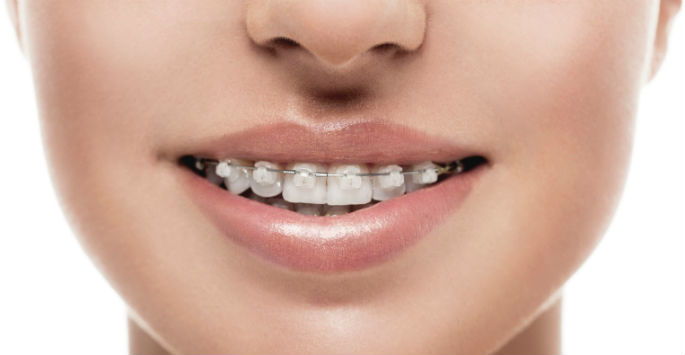The most common reason patients are fitted with braces is also the most obvious. If you have one or more teeth in your mouth growing in entirely the wrong direction, braces can correct the problem with surprising effectiveness. And given the fact that most people aren’t blessed with perfectly straight teeth, millions of kids, teenagers and adults alike are recommend braces by their dentists.
The good news being that in this day and age, braces aren’t nearly as unsightly or uncomfortable to wear as they used to be. If you’d prefer your braces to be borderline invisible, no problem. By contrast, anyone looking to make a statement can opt for the kinds of braces that are bright, bold and beautiful in the extreme. Best of all, even the most effective and comfortable braces on the market are becoming more affordable and accessible all the time.
Aside from noticeably crooked teeth however, there are many other reasons why you may benefit from braces. Along with addressing the physical appearance of the teeth, braces can be used to provide relief from an extensive array of oral health problems and general complaints. From headaches to earaches to tooth decay to gum disease, braces perform a function that goes far beyond the aesthetics alone.
It’s simply a case of determining whether you yourself could benefit from braces – something best left to your dentist.
So just to illustrate the point a little more clearly, what follows is a brief rundown of five of the lessobvious reasons why you may benefit from braces:
1. Crowded Teeth
The first of which being crowded teeth – a common issue where there simply isn’t enough room in the mouth (or in one specific area of the mouth) for the teeth to grow correctly. A good way of identifying whether you may be affected by crooked teeth is to check whether or not you can easily slide a piece of dental floss between them. There doesn’t need to be any specific gap between your teeth, but it should nonetheless be relatively easy to get a piece of dental floss in there and clean these spaces efficiently. If not, it can be difficult to properly clean your teeth and gums alike, opening the door to any number of problems. If you suspect you may have a problem with crowding, it’s worth bringing it to the attention of your dentist who can advise you accordingly.
2. Biting or Chewing Issues
The structure of your mouth and the way your teeth are positioned can have a huge impact on your ability to comfortably and effectively bite and chew your food. In some instances, common problems like overbites, underbites, incorrect jaw position and jaw joint disorders can be enormously life-affecting and should be addressed at the earliest possible juncture. In others, they may have little to no detrimental effect on your everyday life and are therefore no real cause for concern. Nevertheless, as we become accustomed to our mouths and the layout of our teeth relatively early on in life, we generally consider our mouths, our biting and our chewing action to be normal. If there are minor or moderate issues, they tend to go overlooked. Hence, it’s worth speaking to your dentist if you have any concerns whatsoever.
3. Speech Impediments
In more advanced cases, issues with the positioning of teeth within the mouth can lead to a variety of speech impediments. Many people struggle to make certain sounds when communicating, which could be a direct result of any number of contributory problems with your teeth and jaw. The good news being that in the overwhelming majority of instances, simple dental devices like braces can be used to correct the problem – often with no additional surgery required. As such, anyone struggling with a speech impediment is advised to bring it to the attention of their dentist as soon as possible. Correcting the issue could be easier than you think.
4. Combatting Bad Breath
In some instances, bad breath can seem impossible to get rid of. Use the best electric toothbrush of 2018and a dentist-recommended water flosser, yet somehow fail to maintain fresh breath for more than an hour or so. Should this be the case, there are literally hundreds of reasons why you could be suffering from persistent bad breath. One of which being crowded or crooked teeth – a problem that often leads to debris becoming lodged between the teeth, ultimately creating a breeding ground for germs and bacteria. The problem being that in most instances where this is the case, those affected have absolutely no idea as to the cause of the problem. All cases of persistent bad breath should be brought to the attention of a dentist as early as possible, in order to rule out any potentially serious underlying problems.
5. Genetics
Last but not least, genetics often play a key role in determining whether or not you’re likely to need braces. If your parents and their parents all suffered similar problems with crooked or crowded teeth, for example, chances are you yourself will be affected to some extent or another. While it’s not to say that these problems are always passed down between generations, genetics will always have an effect on your oral health and general physical health throughout life.
The takeaway…
In a nutshell therefore, it’s important to remember that it isn’t always blindingly obvious when and where braces could be beneficial. Not only this, but anyone facing the prospect of braces should take into account just how far things have progressed over recent years and decades. Traditionally one of the worst things anyone could ever hear from their dentist, being told you need braces these days really isn’t the punishment it used to be. It may not be the best news you’ll ever hear, but braces are no longer something to instinctively fear.
